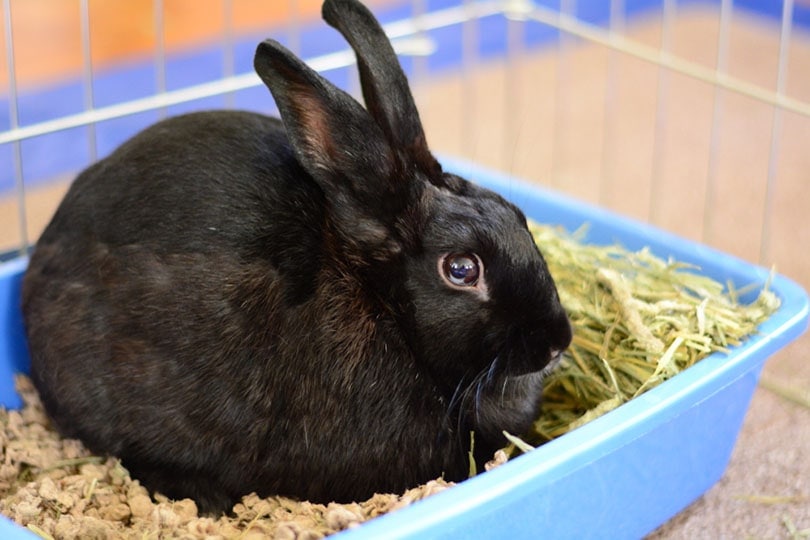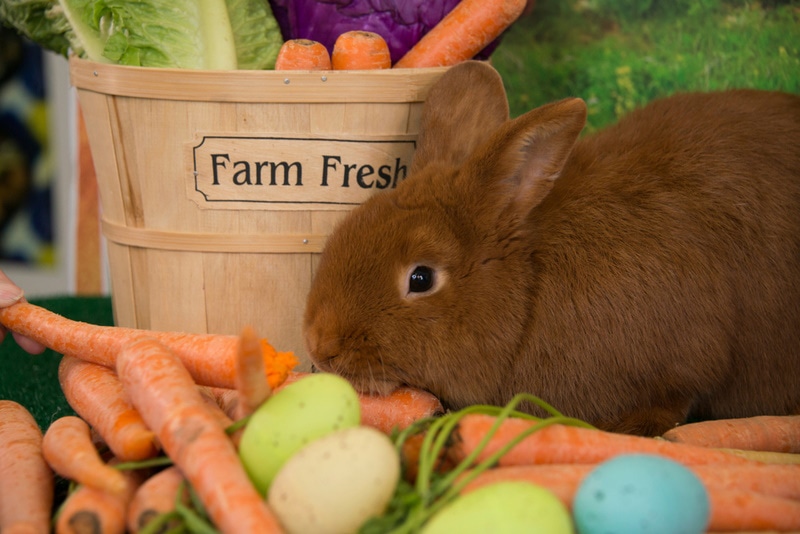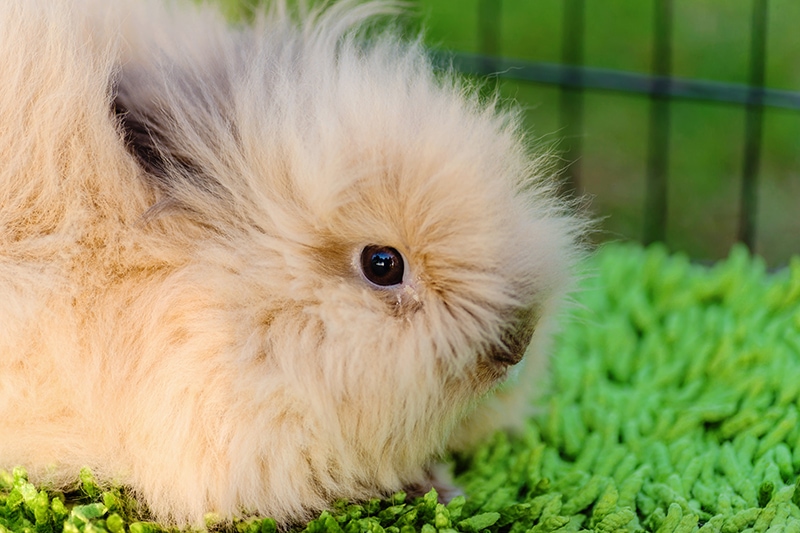Standard Chinchilla Rabbit: Care, Pictures, Temperament, Habitat & Traits
Updated on
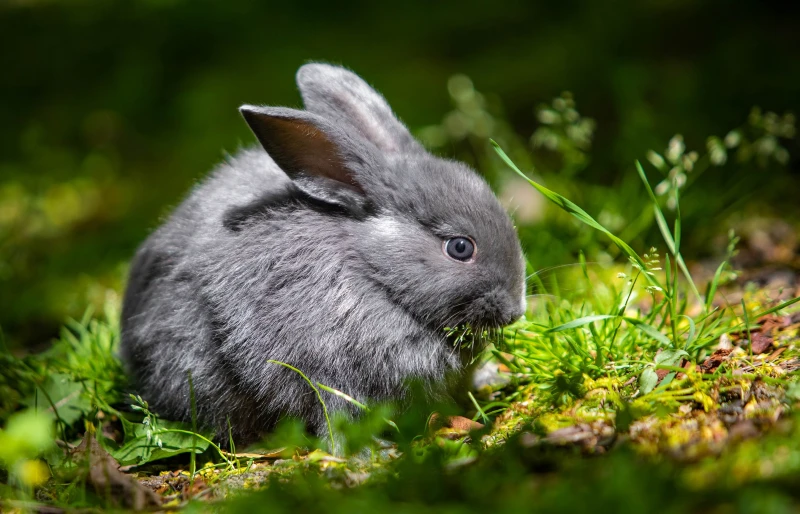
The Standard Chinchilla Rabbit is the smallest of the three types of Chinchilla Rabbits. They weigh between 6 and 8 pounds and live for 5 to 10 years. If you’re looking to adopt a Standard Chinchilla Rabbit, they do well with any type of owner, whether you’re a beginner or an expert in caring for rabbits.
Before you decide to give one of these rabbits a forever home, there are a few things you should know and consider first; we’ll them below, so join us as we delve further into the Standard Chinchilla Rabbit breed.
| Size: | Standard |
| Weight: | 6 to 8 pounds |
| Lifespan: | 5 to 10 years |
| Similar Breeds: | American Chinchilla, Giant Chinchilla, Havana, Himalayan, Dutch |
| Suitable for: | All types of rabbit owners, from beginners to experts |
| Temperament: | Friendly, mild, laidback |
The Standard Chinchilla Rabbit is a friendly animal with a mild laidback disposition. This rabbit is known for its deep, rich earthy colors: chestnut, tan, and brown. The Standard Chinchilla Rabbit further distinguishes itself with its small, compact body and pearly eye bands.
We’ll discuss everything else you need to know about this stunning rabbit in the sections below.
Standard Chinchilla Breed Characteristics
 How Much Do These Rabbits Cost?
How Much Do These Rabbits Cost?
The average price for a Standard Chinchilla Rabbit is between $40 and $80 from a reputable breeder. If you’re looking for a breeder for your Chinchilla Rabbit, make sure that you do your research so you find one that maintains sanitary facilities and performs health tests on their bunnies. The average price will vary depending on the breeder and the area you’re in.
The Standard Chinchilla rabbit came to America in 1919. After that, the American Chinchilla Rabbit Association was formed in 1923. This breed is also recognized by ARBA, The American Rabbit Breeder’s Association. Sadly, all three of these breeds are considered endangered at the moment, so if you find one for a pet, take care of it and keep it healthy.
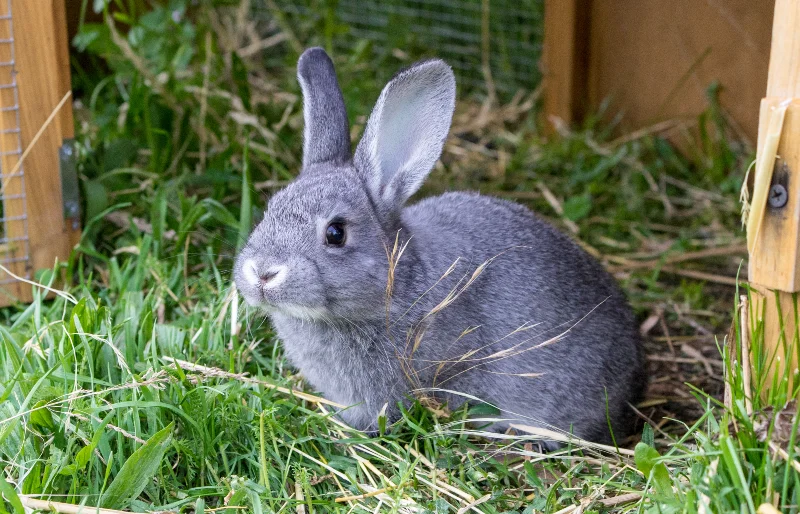
Temperament & Intelligence of the Standard Chinchilla
These rabbits have a temperament that is considered docile, laid-back, and sweet. In fact, the Chinchilla rabbit is often recommended for first-time pet owners. As with any pet, socialization is key from an early age so that the rabbit can get used to being held and becoming comfortable around humans.
The Chinchilla is a sociable rabbit, and unlike some breeds, it enjoys spending time with humans. It’s not the kind of pet that you can just feed and sometimes groom. It requires attention from its family and needs daily exercise to maintain its weight and health. Although it’s friendly, Chinchilla rabbits need time alone sometimes, and if they don’t want to be held or petted, leave them alone and try interacting at a later time.
Do These Rabbits Make Good Pets? 👪
Since the Standard Chinchilla Rabbit is laidback and docile, they make extraordinary pets. However, as with any animal you keep as a pet, you need to ensure that your children are supervised and taught how to treat and handle your pet.
If the Chinchilla Rabbit feels in danger or your child injures the rabbit, it will bite. Since they have a blind spot in the center of their vision, approach the rabbit from the side rather than from overhead. They can become spooked easily if you or another family member reaches out from above and try to pet them.
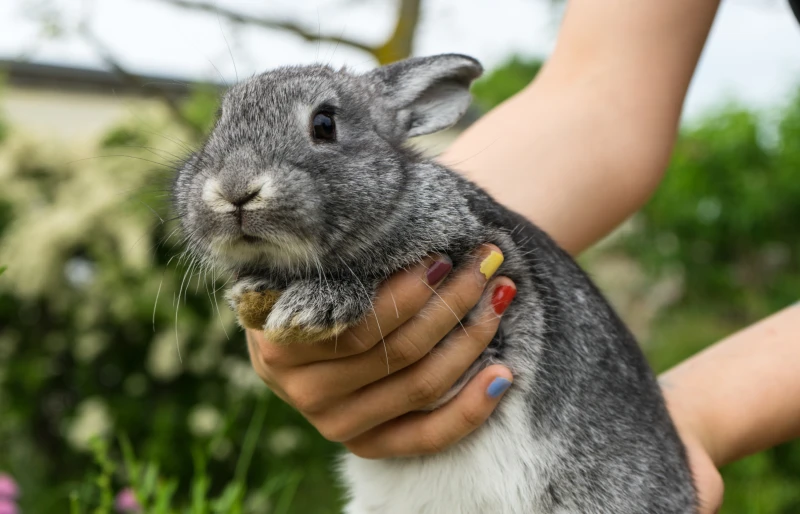
Does This Rabbit Get Along with Other Pets?
The Standard Chinchilla Rabbit can get along with other pets, but it’s important to remember that the breed is an ancestor of a wild rabbit. Your dogs and cats may see the rabbit as something to chase and hunt, and the Chinchilla Rabbit may see your dog and cat as predators.
It’s best not to leave the rabbit and other pets in a room alone and to supervise them whenever they are to avoid accidents, injuries, or worse, from happening to either pet. Typically, the rabbit will get along better with smaller dogs and cats they grow up with.
Things to Know When Owning a Standard Chinchilla
Now that you know what to expect if you decide to give a Standard Chinchilla Rabbit a forever home, you may have decided to adopt one. Once you’ve found a reputable breeder, there are still a few facts you’ll need to know when caring for the rabbit. In the section below, we’ll discuss food, living, exercise, and sleeping needs, as well as training, grooming, lifespan, and health conditions.
Food & Diet Requirements 🥕
Standard Chinchilla Rabbits require plenty of fresh, filtered water and Timothy hay. You’ll also want to provide leafy, green veggies every day and a small portion of pellets. At least 70% to 80% of the rabbit’s diet should be hay, and 15% or more should be vegetables. Pellets made from Timothy hay should only account for 5% or less of the diet since they are packed with carbohydrates and can cause obesity if fed too often. Fruit can be provided as a treat but only once or twice a week.

Habitat & Hutch Requirements 🏠
While the Standard Chinchilla Rabbit is smaller than many other breeds, they still need plenty of room to roam and exercise. A large hutch with an outdoor run attached is best for this breed. If possible, you should have a multilevel hutch so that the rabbit can exercise by going up and down the levels. A hutch that measures 24” x 24” x 36” is the minimum size the rabbit needs to stay healthy.
Make sure there is a door with a sturdy lock on the hutch so that no predators can get into the hutch and harm your rabbit. You can line the hutch with paper-based bedding and provide a constant supply of hay for the rabbit to nibble on. A solid floor is preferable to a wire one because the Chinchilla can injure its feed if they get stuck. However, wire walls are okay and provide adequate ventilation.
Exercise & Sleeping Needs 🐇
In the wild, rabbits usually run around 3 miles a day. Though your rabbit is domesticated, it still needs around the same amount of exercise. Make sure your rabbit has at least 3 hours of free range time a day, whether in a run or a fenced-in yard. You can even let them run inside the house but try to rabbit-proof your home first. Secure electric cords, remove toxic plants, and keep your other pets in another area while the rabbit exercises.
You should also provide a place where your rabbit can hide when it feels the need, as well as an area to sleep that is hidden away from prying eyes.
Training 🥎
While it’s not as easy to train your rabbit as it is to train your dog, it can be done. It’s possible to teach a Chinchilla Rabbit to use a litter box; sometimes, you can train them to come when you call their name. Do all this with positive reinforcement and plenty of love and praise, just as you would with any pet you train. Chinchillas, like other rabbits, are food-motivated, and you can use small pieces of fruit or veggies when training them.
Grooming ✂️
The Standard Chinchilla Rabbit, like all breeds of Chinchilla Rabbit, has a lustrous, rich coat. This means that they require more grooming than many other rabbits. You should expect to brush your little friend at least twice a week for most of the year, but you should brush them daily during the shedding season. If you don’t have the time or aren’t sure how to groom your rabbit, it’s best to hire a professional groomer to do the job for you. They don’t need to be bathed, but you should wipe down their feet to remove debris and litter from the litter box.
Lifespan and Health Conditions 🏥
As with any breed, the Standard Chinchilla Rabbit can suffer from some serious and minor health conditions. The best way to keep these conditions from happening to your rabbit is by regularly taking your furry friend in for checkups so that any health issues can be caught early on and treated.
- Malocclusion
- Ear mites
- GI Stasis
- Flystrike
Male vs. Female
There are very few differences between the males and females of this rabbit breed. The male is a bit larger than the female, but the rabbits have similar personalities and habits. However, they’re less likely to display undesirable behaviors, such as aggression, spraying, and mounting if they’re fixed. Neutering a male also reduces his chances of suffering from testicular cancer.
3 Little-Known Facts About Standard Chinchilla
Now that you’ve decided to give a Standard Chinchilla Rabbit a forever home, stay tuned for a few interesting facts about this adorable rabbit.
1. Standard Chinchilla Rabbits Are the Smallest of the Breed
Standard Chinchilla Rabbits are the smallest of the Chinchilla Rabbit Breed. The other types are Giant Chinchilla Rabbits and the American Chinchilla Rabbit; all three of these rabbits are allowed to enter competitions.
2. A Single Chinchilla Rabbit Is a Lonely Rabbit
Though you wouldn’t think so, owning more than one Chinchilla rabbit is best, as they get lonely without company. Just make sure you have plenty of room for both rabbits and hideaways where they can get away from one another to be alone.
3. Standard Chinchilla Rabbits Are the Perfect Size for Children
Because of their size, these rabbits make great pets for children, as the children’s hands are little enough to hold them. Just make sure you always supervise playtime so that no one gets hurt.

Final Thoughts
Standard Chinchilla Rabbits are adorable balls of fluff that make great pets. They are the smallest of their kind, even though they are considered medium-sized rabbits. They make good pets for children as long as you supervise and teach your kids how to handle their pets safely.
It’s also imperative to socialize your Chinchilla Rabbit early on so that they can get along with others. It is a sociable breed, so you need to spend time playing with your rabbit every day. If you’re looking to give this rabbit a forever home, provide everything it needs to live a happy, healthy life, and the two of you will be pals for a long time.
Featured Image Credit to: Photospirit, Pixabay
 How Much Do These Rabbits Cost?
How Much Do These Rabbits Cost?
